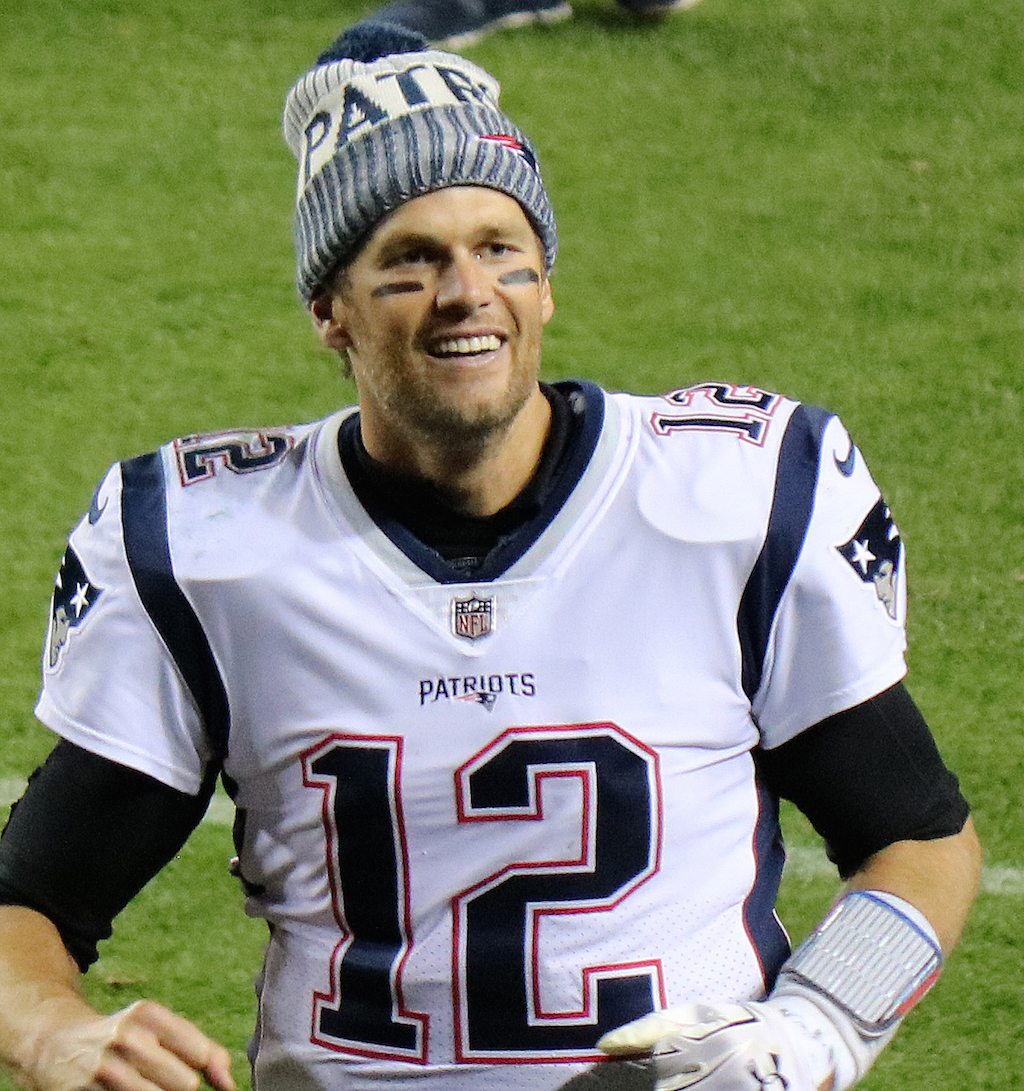Tom Brady’s Diet: It Seems to Work for Him
The quarterback drinks up to 25 glasses of water a day, mostly with his self-branded "TB12" electrolyte, and his diet is free of caffeine, gluten, dairy, fungus, sugar and GMO products. And hold the tomatoes. Tom Brady's diet is all about anti-inflammatories and alkalizing his body. (Jeffrey Beall / CC BY 4.0)
Tom Brady's diet is all about anti-inflammatories and alkalizing his body. (Jeffrey Beall / CC BY 4.0)
The Super Bowl causes unreasonably high calorie consumption on couches across America each year, but those out on the field are fueled by much more than a party-sized plate of nachos. Take Tom Brady, one of America’s most popular (and possibly one of the most hated) professional football players, whose pre-Super Bowl diet is far more obscene than the $50 worth of chicken wings marinating in your fridge. Spoiler: There’s no salsa, pizza or beer. Or really, much of anything.
As Brady reveals in his new book, “The TB12 Method: How to Achieve a Lifetime of Sustained Peak Performance,” the quarterback of the New England Patriots is a hugely water-based mammal. He drinks 12-25 glasses of water a day, most of them mixed with his own, self-branded TB12 electrolyte concentrate. He has a self-imposed rule that he won’t drink water more than half an hour before a meal, though he also loads up on protein shakes and smoothies, so it’s unclear how much of his diet is liquid.
Nutritionist Haylie Pomroy, author of the upcoming “Metabolism Revolution,” doesn’t think there’s necessarily anything problematic about Brady’s massive consumption of water. She suggests aiming to drink half your body weight in ounces of water each day, so if you’re 160 pounds, 80 ounces of spring water should be your goal. Add 8 ounces for every hour you’re on an airplane, plus the water you may need with increased activity, like football practice, and you’ll be safely hydrated.
Brady’s diet, which is also caffeine-free, gluten-free, dairy-free, fungus-free, sugar-free and GMO-free, sounds not just extremely limiting, but potentially dangerous to the average human. Where are the nutrients coming from if you don’t want to (or realistically can’t) buy a $50 box of branded TB12 snacks?
“Tom is an extreme athlete,” Pomroy, who works with NBA and NFL players, says. “What’s important to grasp here is that no matter what you’re doing in life, your diet is [fueling] you for performance.” Pomroy uses the acronym DIET, which stands for “Did I Eat Today.” It’s a question anyone can ask themselves to consider whether the food they consumed optimally affected their lifestyle—did you eat to not have headaches or to win a Super Bowl?
Brady’s diet is all about anti-inflammatories and alkalizing his body (at his level of athletic elitism, one’s body truly is a multimillion-dollar entity). Aside from bananas, grapes and blueberries, Brady doesn’t eat much fruit, and when he does, he doesn’t mix it with other foods. “Eat fruits alone,” he writes in his book. “They digest quickly. Other foods don’t.”
The American Institute for Cancer Research states there is no research to suggest that eating fruits separately from other foods is beneficial to the human body. As a mom, Pomroy says she wishes Brady ate more fruit, but she endorses a heavily plant-based diet, especially when one is not denying one’s body complex carbs. “Diets where you avoid complex carbs slow your metabolism and can be dangerous,” she says.
One limitation of Brady’s plant-based lifestyle is that he doesn’t consume nightshades, which include tomatoes, potatoes, eggplants, bell peppers and chili peppers, all thought, though not proven, to cause inflammation.
“There’s no scientific evidence that nightshade vegetables … cause inflammation,” dietitian Sarah-Jane Bedwell told Self in January 2016. “In fact, these vegetables are great sources of antioxidants such as vitamin C and lycopene, which can actually help reduce inflammation and disease. Plus, since we all need to eat more vegetables, there’s no reason to avoid these—science shows their benefits and does not indicate any risks of consuming them.”
Cutting out nutrient-rich whole foods and ignoring science is worrisome, especially for the average person who doesn’t have a personal trainer, chef and a slew of other specialists assessing her every move. As a writer for Men’s Health puts it: “Brady’s diet is full of buzzwords, not science,” which is essentially the problem with the social media-fueled nutritional fads that dominate diets in the 21st century.
According to Brady’s chef Allen Campbell (no relation to the famous soup brand, which is forbidden in the Brady household), the athlete’s diet is completely free of white flour, white sugar, MSG and iodized salt. Campbell (who is not a certified nutritionist, though he did take a six-week course on plant-based nutrition a few years back), says 80 percent of Brady’’s diet is vegetables. Every piece of produce Campbell uses to feed Brady must be organic, or else he’s not cooking with them. Whole grains also fall into this category. The other 20 percent consists of “lean meats: grass-fed organic steak, duck every now and then, and chicken,” Campbell told Boston.com. “As for fish, I mostly cook wild salmon.”
Though Brady’s diet isn’t for everyday Americans, Pomroy likes that it “shows the power of food.” Nutrition is a tricky science. Sure, it’s based on research and fact, but it’s also, to some extent, based on arbitrary personal feelings. Eliminating sugar is undeniably healthier, but are you feeling better because you stopped snacking on cookies or because you started replacing baked goods with apple slices?
It’s easy to critique someone’s else’s restrictive diet—especially when he has an endless stream of income and a dedicated personal chef to put together whatever wacky snacks and meals he requires to maintain his energy—but when it comes down to it, Brady’s diet must work for him to some extent. After all, he’s the one wearing five Super Bowl wings while we’re licking buffalo sauce off our thumbs.
Independent journalism is under threat and overshadowed by heavily funded mainstream media.
You can help level the playing field. Become a member.
Your tax-deductible contribution keeps us digging beneath the headlines to give you thought-provoking, investigative reporting and analysis that unearths what's really happening- without compromise.
Give today to support our courageous, independent journalists.





You need to be a supporter to comment.
There are currently no responses to this article.
Be the first to respond.